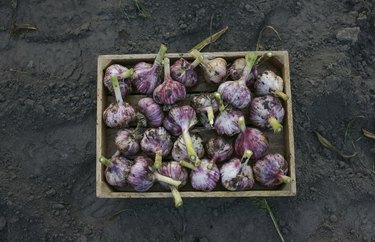
Every year, nearly 50 million people in the United States eat something that makes them sick, according to the Centers for Disease Control and Prevention. Produce is a common cause of food poisoning, but garlic poisoning is more likely to occur due to poor handling at home.
Garlic for Flavor and Health
Video of the Day
Related to onions, shallots and leeks, garlic is a root vegetable used for both culinary and medicinal purposes. According to Oregon State University, the organosulfur compounds found in the root vegetable are responsible for its flavor and health benefits.
Video of the Day
Chopping, mincing or crushing your garlic clove triggers the release of an enzyme that breaks down the organosulfur compounds that produce its sharp, distinct flavor. From a nutritional standpoint, garlic not only bolsters the flavor of your food, but also supplies essential nutrients that support general health, including calcium, selenium, vitamin B6 and vitamin C. It may also help reduce your need for less healthy flavor enhancers, such as salt.
As for its medicinal uses, the flavorful herb is purported to lower cholesterol and blood pressure, prevent cancer and treat the common cold. However, according to the National Center for Complementary and Integrative Medicine (NCCIM), the evidence to support the health benefits of garlic is slim.
NCCIM notes that research on garlic and cholesterol is conflicting, and evidence for garlic's benefits for blood pressure is weak. Though there's some evidence that regular consumption of garlic may reduce your risk of certain types of cancer (stomach and colon), the same cannot be said for garlic supplements. As for the common cold, NCCIM says there's simply not enough evidence that garlic offers any benefits to help ease your symptoms or cure the viral infection.
Read more: Which is Healthier, Raw or Cooked Garlic?
Prevention of Garlic Poisoning
You may not think of garlic as being bad for your health, but food poisoning from garlic is a possibility. However, garlic poisoning is more often caused by poor handling of the root vegetable at home, according to Michigan State University Extension.
Garlic-flavored oil may be a staple in your kitchen, but if you're preparing your own at home you may place yourself at risk of botulism. Spores of Clostridium botulinum are found in the soil and may inadvertently contaminate your bulb of garlic. When exposed to oxygen these spores are harmless.
However, Clostridium botulinum spores thrive in an oxygen-free environment at temperatures of 50 degrees Fahrenheit and above, warns Michigan State University Extension. Your homemade garlic-flavored oil stored in your kitchen cupboard is the perfect environment for the growth of this dangerous bacteria. Furthermore, the bacteria are odorless and tasteless, so there's no way to know until after you've gotten sick.
If you make your own garlic oil, Michigan State University Extension recommends you keep the oil in the refrigerator and discard after three days. If your flavored oil is kept at room temperature for more than two hours, you must throw it away or risk garlic poisoning.
Signs and Symptoms of Botulism
Botulism poisoning is very rare, according to the Mayo Clinic. There are three types of botulism, including foodborne botulism, wound botulism and infant botulism.
Home-canned goods and potatoes cooked in foil and allowed to cool are potential sources of foodborne botulism, along with your homemade garlic-infused oil. Infant botulism is the most common type of botulism and occurs when spores are ingested (from honey, dust or soil) and grow in the intestines of the baby.
Botulism poisoning is serious and requires immediate medical attention. The toxin affects your nervous system and muscle control and can be deadly if it affects your respiratory system. Symptoms of foodborne botulism from garlic poisoning include:
- Dry mouth
- Problems swallowing or talking
- Blurry vision
- Difficulty breathing
- Paralysis
- Facial weakness or droopy eyelids
- Nausea and vomiting
- Abdominal cramps
Symptoms usually develop within 12 to 36 hours of ingestion. Treatment includes an antitoxin injection. Because of the effects the toxin has on your nervous system and muscles, rehabilitation may be needed to restore function.
- Centers for Disease Control and Prevention: "Attribution of Foodborne Illness: Findings"
- Oregon State University: "Garlic"
- USDA FoodData Central: "Garlic, Raw"
- National Center for Complementary and Integrative Medicine: "Garlic"
- Michigan State University Extension: "Stinking Facts About Garlic"
- Mayo Clinic: "Botulism"
Is this an emergency? If you are experiencing serious medical symptoms, please see the National Library of Medicine’s list of signs you need emergency medical attention or call 911.